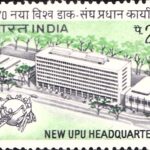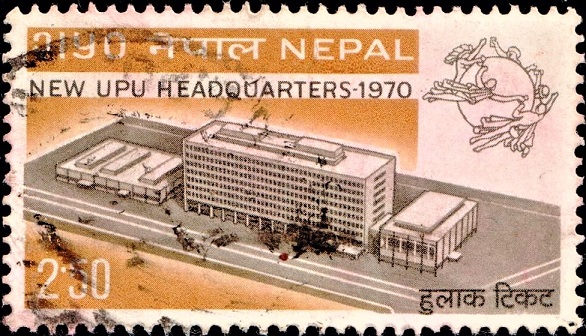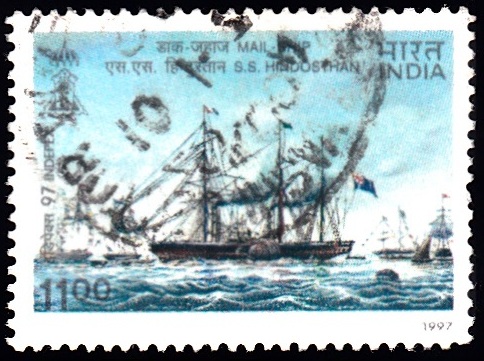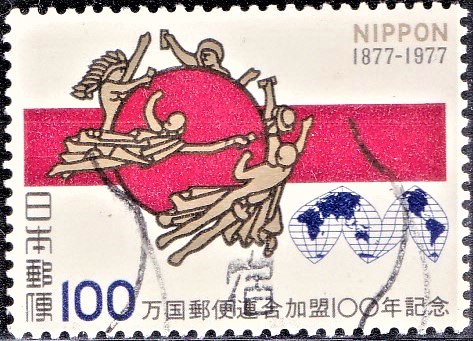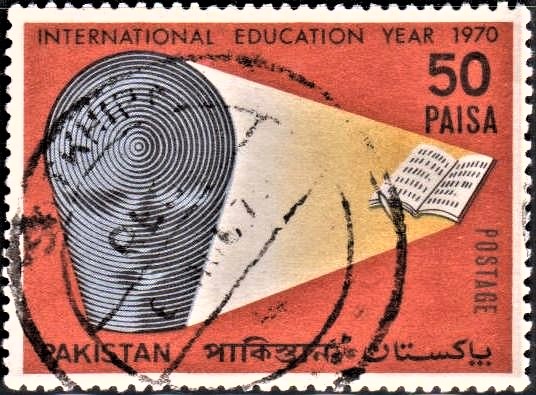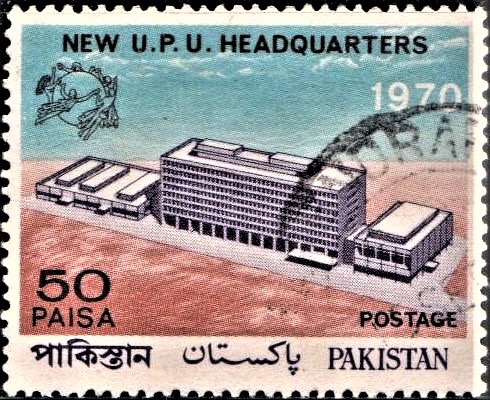
Pakistan on New UPU Headquarters 1970
Complete set of 2 nos. of commemorative postage stamp on the opening of new Universal Postal Union building at Berne :
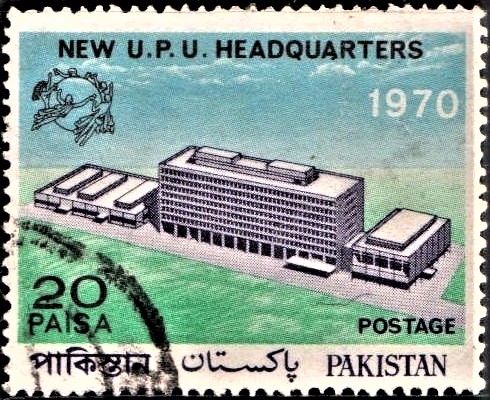
 Issued by Pakistan
Issued by Pakistan
Issued on May 20, 1970
Issued for : The opening of the Universal Postal Union’s new building at Berne (Switzerland) will take place on Wednesday the 20th May, 1970. To commemorate the occasion, Pakistan Post Office is issuing a set of two postage stamps of 20 Paisa and 50 Paisa denominations on 20th May, 1970.
Design : The stamps are horizontal in format. The new building of the Universal Postal Union Headquarters form the main feature of the design and covers the central part of the stamps. The colour of building is Mauve in both the denominations of the stamp. The words ‘NEW UPU HEADQUARTERS’ are printed in black against blue sky. The symbol of the UPU appears on top left corner in black outlines. The year ‘1970’ is shown in reverse in blue sky on top right corner.
The ground is green in 20 Paisa stamp and brown in 50 Paisa stamp. Rest of the features are common to both the values. The value and the words ‘PAISA’ are in black in the foreground in the left corner and the word ‘POSTAGE’ appears in mauve in lower right corner. The words ‘PAKISTAN‘ in Bengali, Urdu and English are printed in mauve colour in the bottom white strip.
Type : Stamps, Postal Used
Denomination : 20 & 50 Paisa
Colour :
20 Paisa … Blue, green, mauve and black
50 Paisa … Blue, brown, mauve and black
Size of stamps : 41 x 33.1 mm.
Size of print : 38 x 30.1 mm.
Perforation gauge : 13 x 13½ (c)
Quantity printed :
20 Paisa … 15,00,000
50 Paisa … 10,00,000
Number of stamps in each sheet : 50
Process of printing : Litho Offset
Printers : The Pakistan Security Printing Corp. Limited, Karachi
About :
- The world postal service is part of the daily life of people everywhere. Its proper running is essential to society and, still more, to the life of the international community. Although the Universal Postal Union is one of the oldest inter-governmental organisations in existence, yet it is not widely known to the public at large. Without going back to the origin of the post in remote antiquity and still less dwelling on its embryonic state in the Middle Ages, we should nevertheless point out that the despatch of letters then depended on the messenger services of royal households, universities and major religious orders. In 1863, on the initiative of the Honourable Montgomery Blair, Postmaster-General of the United States of America, a conference was held in Paris. This conference, which was attended by delegates from fifteen European and American countries, established the general principles, recommended to Administrations as a basis for their mutual agreements.
- It, however, soon became clear that bilateral agreements were no longer sufficient. To cope with situation, a single convention between States concerning postal relations was needed for which a conference was convened at Berne, on 15th September, 1874 which was attended by 22 countries. An agreement was reached and a Treaty commonly known as Berne Treaty was signed for the establishment of a General Postal Union. This was the forerunner of the multilateral Convention governing the international postal service. The Convention came into force on 1st July, 1875. In 1878, The General Postal Union became the Universal Postal Union (U.P.U.).
- Any member of the United Nations may accede to the Union. Sovereign countries which do not belong to the U.N. may request admission to the U.P.U. They are admitted if the request is approved by at least two thirds of the member countries of the Union. Congress, the Executive Council, the Consultative Council for Postal Studies and the International Bureau are the main bodies of the Union. The establishment of the Union has made it possible to standardize the basic charges applied to postal items. Thus, the rate of postage paid by users is based on international standards.
- After the Second World War the UPU’s activities expanded rapidly, because it became a specialised agency of the United Nations and many new nations became independent. Membership increased from 85 in 1945 to 142 in 1969. As a result, the International Bureau’s premises were rapidly outgrown, and the various services had to be dispersed in different buildings. To remedy this situation the, UPU Executive Council in 1966 decided to construct a building big enough to meet the Union’s requirements for many years to come.


